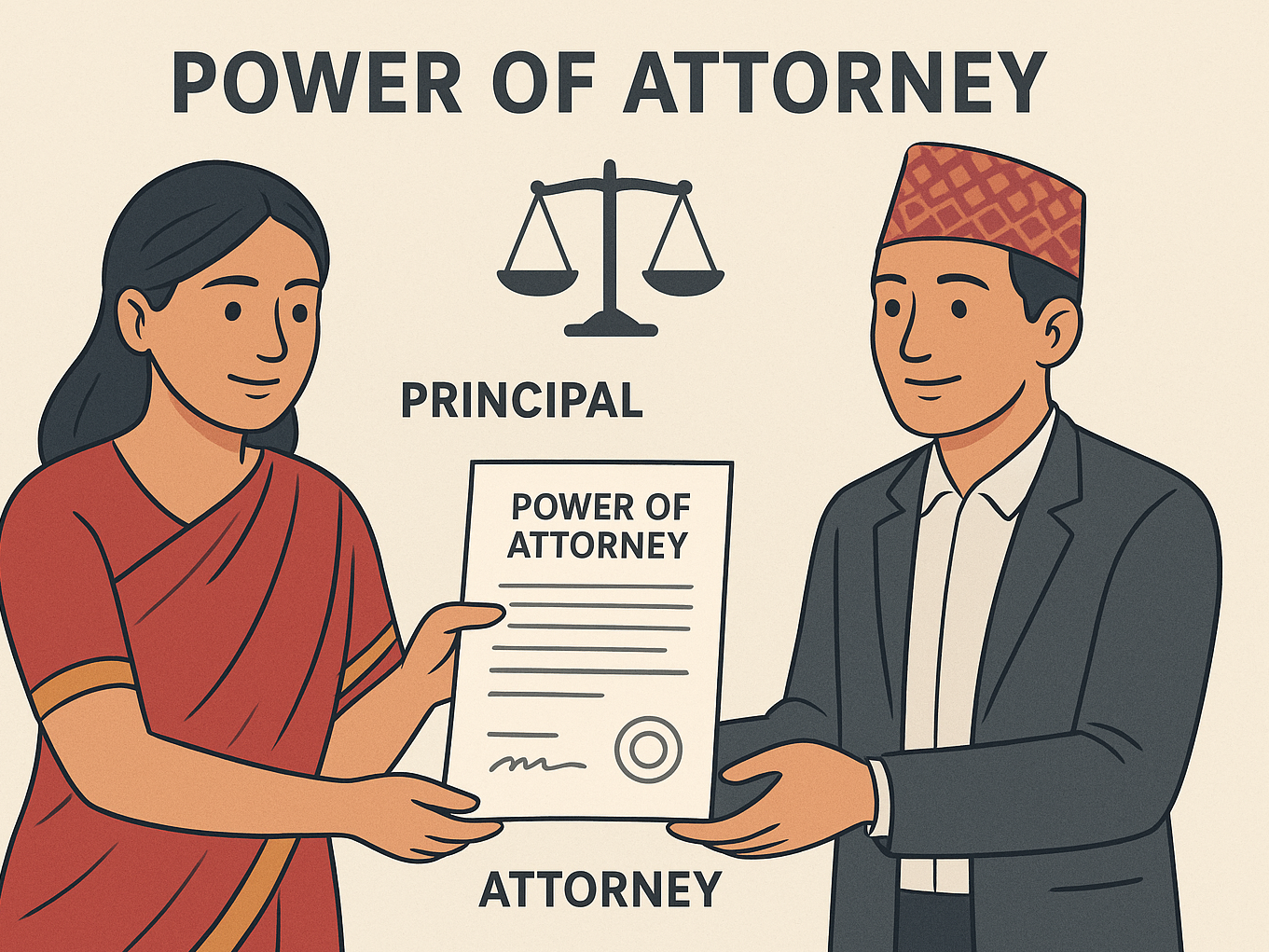
In Nepal, a Power of Attorney (POA) is a common legal document that allows one person (known as the principle, “mukhya byakti”) to authorise another person (known as the attorney or agent, “pratinidhi”) to act on their behalf in legal, financial, or administrative affairs.
Represent Someone in Legal or Court Matters.
If a person is unable to appear in court due to illness, travel, or living overseas, they may appoint a trusted representative (often a lawyer or family member).
For example, signing court paperwork or representing the principal during hearings.
Manage property or real estate transactions.
A power of attorney is commonly used for:
purchasing or selling a home or piece of land.
Overseeing the Land Revenue Office’s (Malpot Karyalaya) property-related paperwork.
paying land taxes, transferring title deeds, or collecting rent.
To Manage Banking or Financial Transactions
Previously:
Take money out or put it in.
Create or terminate a bank account.
Gather dividends, pensions, and other financial claims.
For Foreign-Based Individuals
POA is commonly used by Nepalese nationals who work or reside overseas to give their family permission to:
- Take care of court cases.
- Control the registration of land.
- Send applications to the appropriate government offices.
For Governmental or Administrative Processes
It can be applied to:
- Sign or deliver paperwork to offices.
- Attend meetings of the government or business.
- Obtain or renew permissions and certificates.
Legal Basis in Nepal
the Muluki Civil Code 2074 (2017), Part 4, Chapter 2 (Adhikar Patra sambandhi byabastha). governs the Power of Attorney issues in Nepal
- Must be in written, signed, and notarised or attested by a lawyer or notary public (or certified by the District Administration Office abroad).
Types of Power of Attorney
- General Power of Attorney – broad authority over many things.
- A special (limited) power of attorney is restricted to a certain task, such as selling a specific property.
- Durable power of attorney – remains valid even if the principal becomes incompetent (unusual in Nepal).
1.Define a Power of Attorney (POA).
A Power of Attorney is a legal document in which one person (the “principal”) authorises another person (the “agent” or “attorney-in-fact”) to act on their behalf in legal, financial, or personal affairs.
2. Is power of attorney recognised internationally?
Yes, however each country has unique legal requirements for recognising and enforcing a Power of Attorney. A power of attorney that is valid in one nation may need to be notarised, legalised, or apostilled before it may be accepted in another.
3.What are the most common types of power of attorney used globally?
- While the names and regulations differ, the most frequent varieties are:
- General Power of Attorney: broad powers.
- Limited (or Specific) Power of Attorney – Only applicable to specific tasks or time periods.
- Durable power of attorney – remains valid even if the principal becomes disabled (common in the United States).
- Springing POA – Only applies to a single event (e.g., incapacity).
- Medical Power of Attorney – Grants the authority to make healthcare choices.
4. Can I utilise a POA from one nation in another?
- Possible, but further steps, such as:
- Translation to the local language.
- Notarisation in the issuing country.
5.Do I need a lawyer to draft my power of Attorney?
Not usually, however it is strongly advised, particularly for cross-border transactions. A lawyer guarantees that the POA meets local and international legal standards and represents your individual requirements.
6.Can Powers of Attorney be revoked?
Yes. A principal can cancel a power of attorney at any moment, as long as they are mentally competent. Revocation should be made in writing and distributed to all parties involved.
7. Is a POA still valid after the principal’s death?
No. When the principal dies, the Power of Attorney automatically ceases. Following death, the executor or legal representative of the estate assumes responsibility.
8. Can I have several agents under a single POA?
- Yes. A POA can appoint many agents to act:
- Jointly (everyone must agree to activities)
- Severally/Independently (everyone may act alone)
- The structure should be clearly defined in the document.
9. Can digital or electronic powers of attorney be utilised internationally?
Some countries recognise digitally signed POAs, particularly those using secure platforms and identity verification. However, many governments still demand physical signatures and notarisation, especially for overseas transactions.
10. What are the country-specific considerations?
In the United States, state regulations differ; long-term power of attorney is prevalent.
- UK: Uses “Lasting Power of Attorney” for long-term planning.
- In India, a power of attorney must be stamped and may require registration.
- UAE: Arabic notarisation is required, as well as consular legalisation.
- China requires notarisation and potentially consular authentication.
- Each country may have different rules for residents and non-residents, thus local legal guidance is essential.
11. How long do Powers of Attorney last?
This depends on the terms.
Some POAs include an expiration date.
Durable power of attorney agreements are valid until they are revoked or the principal dies.
Limited POAs expire when a certain action is done or time passes.
12, Where should I keep my Power of Attorney?
Keep the original somewhere accessible yet secure.
Your agent (s)
Relevant institutions (banking, hospitals,
Your attorney
Digital backups can be useful, but originals are frequently required for official purposes.
Should you have any quetions please do not hesitate to contact us at +977-9847691209
